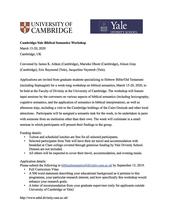Applications are invited from graduate students specializing in Hebrew Bible/Old Testament (including Septuagint) for a week-long workshop on biblical semantics, March 15-20, 2020, to be held at the Faculty of Divinity at the University of Cambridge. The workshop will feature input sessions by the conveners on various aspects of biblical semantics (including lexicography, cognitive semantics, and the application of semantics in biblical interpretation), as well as afternoon trips, including a visit to the Cambridge holdings of the Cairo Genizah and other local attractions. Participants will be assigned a semantic task for the week, to be undertaken in pairs with someone from an institution other than their own. The week will culminate in a small seminar in which participants will present their findings to the group.
The workshop is a shared initiative of both the longstanding Semantics of Ancient Hebrew Database project based at the Faculty of Divinity at the University of Cambridge (http://www.sahd.divinity.cam.ac.uk/) and the newly formed Renewed Philology working group (https://renewedphilology.yale.edu/).
Funding details:
• Tuition and scheduled lunches are free for all selected participants.
• Selected participants from Yale will have their air travel and accommodation with breakfast at Clare college covered through generous funding by Yale Divinity School. Dinners are not included.
• All others will be expected to cover their travel, accommodation, and evening meals.
Application details:
Please submit the following to biblicalsemantics@divinity.cam.ac.uk by September 15, 2019.
• Full Curriculum Vitae
• A 500 word statement describing your educational background as it pertains to this programme, your particular research interest, and how specifically this workshop would enhance your research goals.
• A letter of recommendation from your graduate supervisor (only for applicants outside University of Cambridge or Yale)
